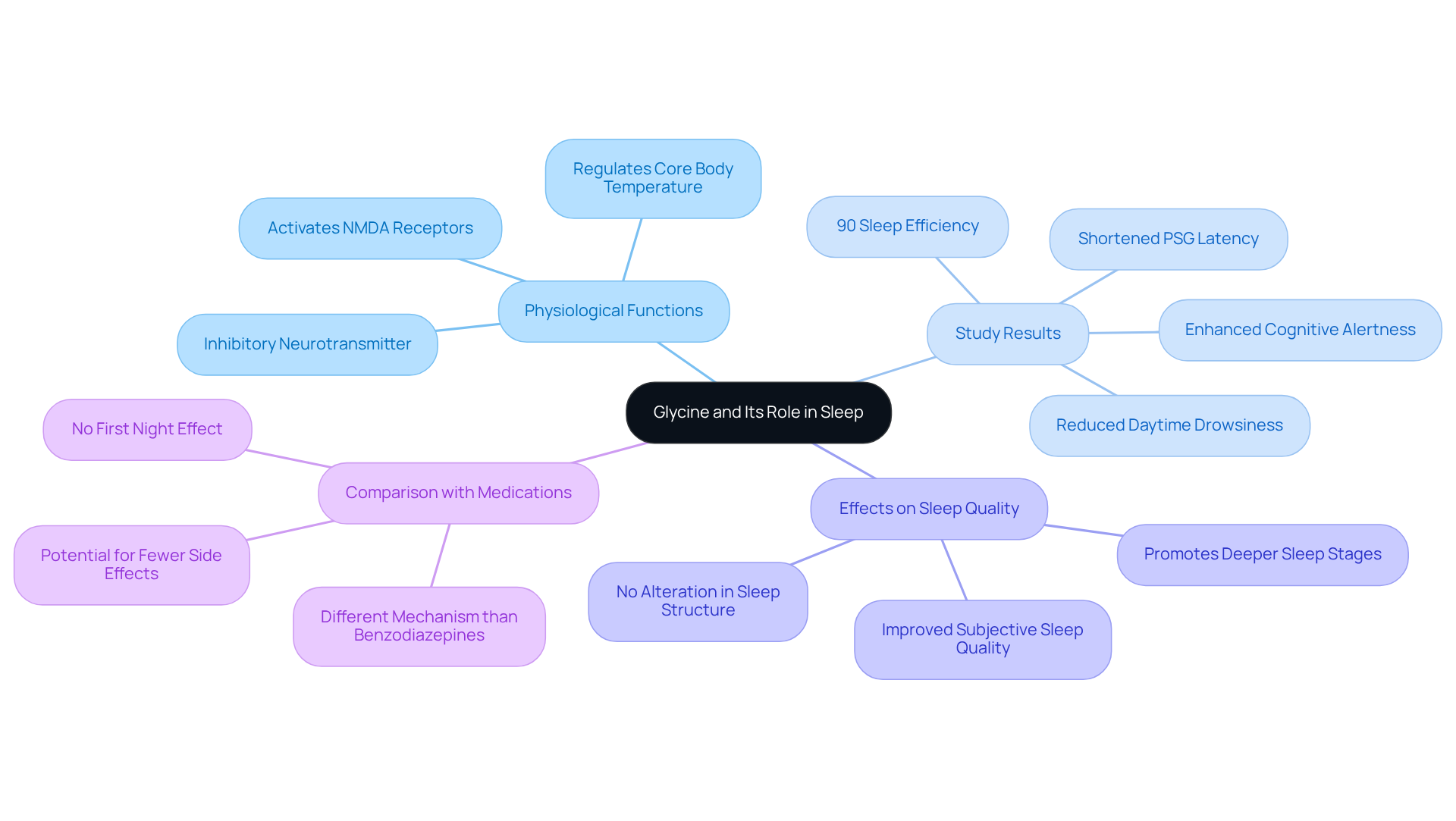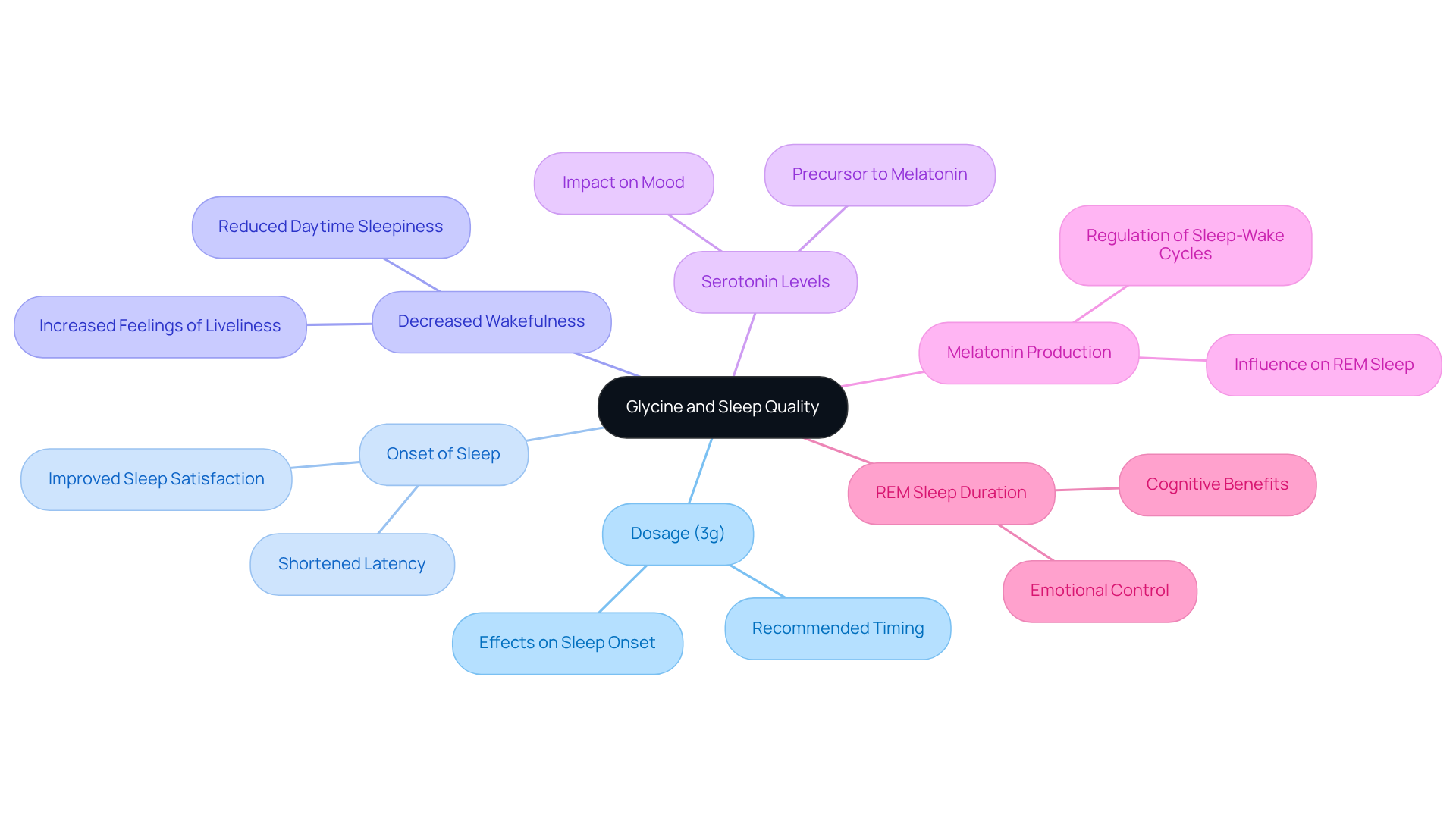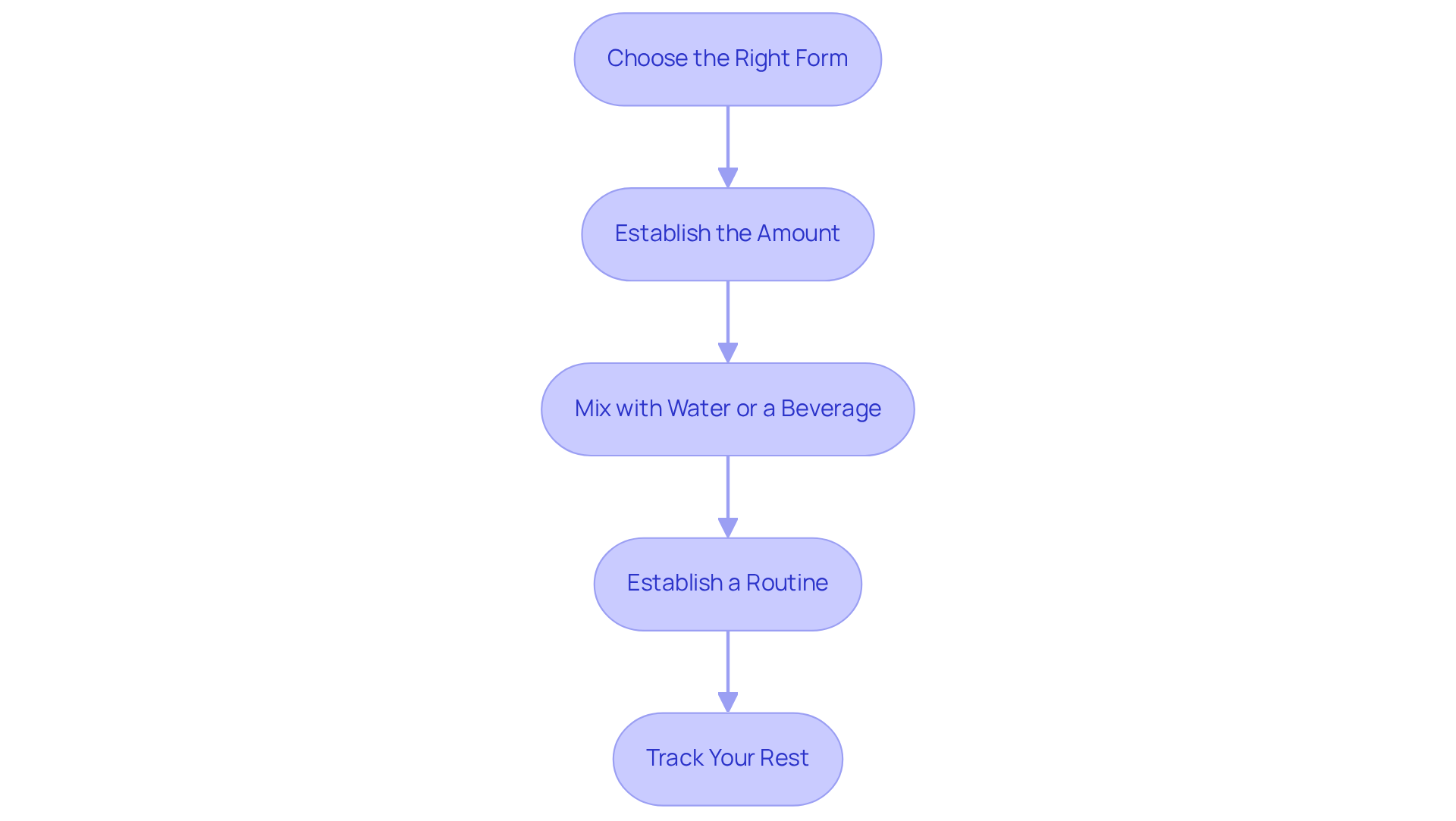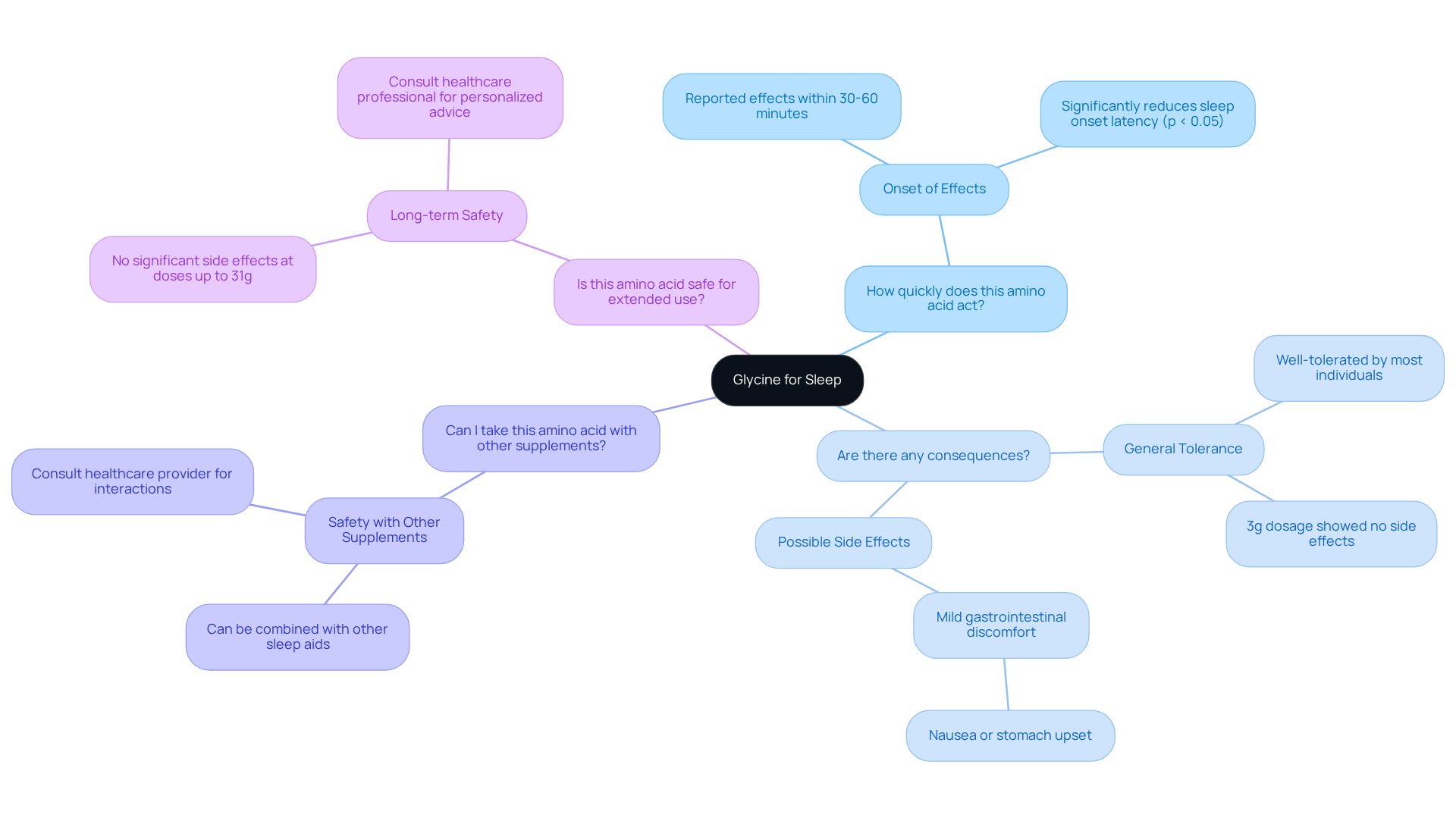How Long Does It Take Glycine to Work for Sleep Effectively?
Overview
Glycine is known for its calming effects, typically taking about 30 to 60 minutes to work effectively for sleep. Users often report experiencing these benefits within this timeframe after ingestion. Furthermore, studies support this conclusion, indicating that glycine significantly reduces sleep onset latency and enhances sleep quality. As a result, it emerges as a promising supplement for those seeking better rest. If you’re looking for ways to improve your sleep, exploring glycine could be a beneficial step.
Introduction
Glycine, a non-essential amino acid, has emerged as a key player in the quest for better sleep. Known for its calming effects on the nervous system, this amino acid not only helps lower core body temperature but also enhances the quality of sleep by promoting deeper slumber stages. As individuals increasingly seek natural alternatives to traditional sleep aids, a pressing question arises: how long does it take for glycine to work effectively for sleep? Exploring the science behind glycine’s mechanisms and its practical applications can illuminate the path to achieving restful nights and improved overall well-being.
Understand Glycine and Its Role in Sleep
Glycine, a non-essential amino acid, plays a vital role in numerous physiological processes, particularly in regulating rest. As an inhibitory neurotransmitter, glycine calms the nervous system, facilitating the onset of slumber. Studies suggest that this amino acid significantly lowers core body temperature, a crucial factor for initiating rest, while also improving the quality of sleep by promoting deeper stages of slumber.
In a randomized, single-blinded placebo-controlled crossover study involving 11 participants, those who consumed 3 grams of glycine before bedtime reported over 90% sleep efficiency. They experienced notable reductions in daytime drowsiness and enhancements in cognitive alertness. Furthermore, glycine’s effects on sleep differ from traditional sedative medications; it enhances perceived sleep quality without altering sleep structure. This unique mechanism positions glycine as a promising dietary supplement for individuals looking to improve their sleep quality.
Sleep scientists have highlighted glycine’s role in activating NMDA receptors in the brain, further supporting its function in regulating slumber. As Wataru Yamadera noted, ‘Glycine enhanced subjective sleep quality and sleep efficacy, and reduced PSG latency both to the onset of sleep and to slow-wave sleep without alterations in sleep architecture.’ Overall, understanding the mechanisms of glycine can be beneficial for those seeking to enhance their sleep through dietary changes.

Explore How Glycine Enhances Sleep Quality
Research has demonstrated that glycine supplementation can significantly enhance the quality of rest. A usual dosage of 3 grams consumed before bedtime has been linked to quicker onset of slumber and decreased wakefulness during the night, leading to the inquiry of how long does it take glycine to work for sleep. Glycine’s ability to elevate serotonin levels also contributes to its sleep-enhancing effects, as serotonin is a precursor to melatonin, the hormone responsible for regulating sleep-wake cycles. Furthermore, research suggests that this amino acid can extend the duration of REM rest, which is essential for cognitive abilities and emotional control, leading to inquiries such as how long does it take glycine to work for sleep.

Implement Glycine in Your Sleep Routine
To effectively incorporate glycine into your sleep routine, consider the following steps:
-
Choose the Right Form: Glycine is available in various forms, including powder, capsules, and tablets. The powdered amino acid offers flexible dosing and can be blended into beverages or meals, while capsules and tablets are practical for travel. Select the form that aligns with your preferences for ease of use.
-
Establish the amount: Research indicates that consuming 3 grams of glycine roughly 30 to 60 minutes prior to bedtime can significantly enhance sleep quality, prompting the question of how long does it take glycine to work for sleep. Some individuals may benefit from doses up to 5 grams, as supported by various studies. This dosage has been validated in multiple studies.
-
Mix with Water or a Beverage: If you choose the powdered form, dissolve it in water or a non-caffeinated beverage to facilitate consumption.
-
Establish a Routine: Consistency is crucial for effectiveness. To help your body establish a natural rhythm, aim to take the supplement at the same time each night, considering how long does it take glycine to work for sleep.
-
Track Your Rest: Maintaining a sleep journal can be advantageous. Monitor your sleep patterns and any changes you notice after beginning supplementation. Adjust the dosage or timing as necessary based on your findings. Be aware that some individuals may experience mild side effects, such as nausea or an upset stomach, particularly at higher doses.

Address Common Questions About Glycine for Sleep
Here are some common questions regarding glycine and its use for sleep:
-
How quickly does this amino acid act?
Many users report feeling the effects of glycine within 30 to 60 minutes after ingestion, facilitating quicker sleep onset. Research indicates that glycine administration can significantly reduce sleep onset latency, prompting inquiries about how long does it take glycine to work for sleep, with a statistical significance of p-value < 0.05. This makes it a promising option for those struggling with insomnia. -
Are there any consequences?
Glycine is generally well-tolerated, with most individuals experiencing no significant adverse effects. In fact, a 3-unit dosage of this substance did not result in any side effects in human research studies. However, some may encounter mild gastrointestinal discomfort, such as nausea or stomach upset. Therefore, starting with a lower dose, typically around 3 grams, is advisable to assess individual tolerance before increasing the amount. -
Can I take this amino acid with other supplements?
Glycine can be safely combined with other sleep aids. However, it is prudent to consult with a healthcare provider to avoid potential interactions. This is especially important for individuals taking clozapine, as it may reduce glycine’s effectiveness. -
Is this amino acid safe for extended use?
Current research supports the long-term safety of glycine supplementation, with studies showing no significant side effects at doses up to 31 grams. Nonetheless, it is always wise to consult with a healthcare professional for personalized advice, particularly for individuals with pre-existing health conditions.

Conclusion
Glycine emerges as a compelling solution for those seeking to enhance their sleep quality. This non-essential amino acid not only aids in calming the nervous system but also plays a crucial role in lowering core body temperature, facilitating a smoother transition into slumber. By promoting deeper sleep stages and improving overall sleep efficiency, glycine distinguishes itself from conventional sedatives, offering a natural alternative for better rest.
The article underscores several key insights into how glycine functions as a sleep aid. Research indicates that a dosage of 3 grams, taken 30 to 60 minutes before bedtime, can significantly reduce sleep onset time and enhance sleep quality. Glycine’s ability to elevate serotonin levels, which in turn supports melatonin production, further solidifies its effectiveness in regulating sleep-wake cycles. Additionally, the potential for glycine to improve REM sleep duration highlights its importance in cognitive and emotional well-being.
Incorporating glycine into a nightly routine can be a straightforward yet impactful change for those struggling with sleep issues. By understanding the optimal dosage, timing, and method of consumption, individuals can harness the benefits of this amino acid. Embracing glycine as a supplement not only promotes better sleep but also encourages a holistic approach to health and wellness. Prioritizing sleep quality is essential, and glycine may just be the key to achieving a more restful night.
Frequently Asked Questions
What is glycine and what role does it play in sleep?
Glycine is a non-essential amino acid that acts as an inhibitory neurotransmitter, calming the nervous system and facilitating the onset of sleep.
How does glycine affect body temperature and sleep quality?
Glycine significantly lowers core body temperature, which is crucial for initiating sleep, and it improves sleep quality by promoting deeper stages of slumber.
What were the findings of the study involving glycine and sleep?
In a study with 11 participants who consumed 3 grams of glycine before bedtime, over 90% reported sleep efficiency, along with reductions in daytime drowsiness and improvements in cognitive alertness.
How does glycine’s effect on sleep compare to traditional sedative medications?
Glycine enhances perceived sleep quality without altering sleep structure, unlike traditional sedative medications.
What specific brain receptors does glycine activate to help regulate sleep?
Glycine activates NMDA receptors in the brain, which supports its function in regulating sleep.
What did sleep scientists say about glycine’s impact on sleep?
Sleep scientists noted that glycine enhances subjective sleep quality and sleep efficacy, and reduces latency to both the onset of sleep and slow-wave sleep without changes in sleep architecture.






